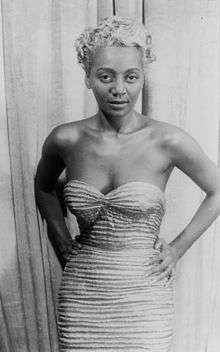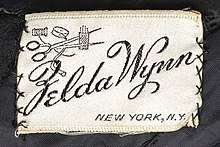Zelda Wynn Valdes
Zelda Barbour Wynn Valdes (June 28, 1905 - September 26, 2001) was an African-American fashion designer and costumer. She is the creator of the original Playboy Bunny costume .
Biography

Zelda Valdes grew up in Charlotte, North Carolina, but was born Zelda Christian Barbour in Chambersburg, PA.[1] She trained as a classical pianist at the Catholic Conservatory of Music.[2] In the early 1920s, Valdes started to work in the tailoring shop of her uncle in White Plains, New York. Around the same time, Valdes began working as a stock girl at a high-end boutique. She eventually worked her way up to selling and making alterations, becoming the shop's first black sales clerk and tailor. Looking back, Valdes said "It wasn't a pleasant time, but the idea was to see what I could do."[3][4]
Beginning in 1935, she had her own dressmaking business in White Plains, New York. She eventually oversaw ladies alterations, and developed her own dressmaking clientele.[1] In 1948, Valdes opened "Zelda Wynn," her design and dressmaking studio, on Broadway (in what is now Washington Heights on Broadway and West 158th Street).[5] Valdes said that her shop was the first black-owned business on Broadway.[1] She sold her dresses to movie star Dorothy Dandridge, opera diva Jessye Norman, and singer Gladys Knight. Valdes also dressed the entire bridal party for the 1948 wedding of Marie Ellington, aka Maria Cole and Nat King Cole.[4] Additional celebrity clients included Josephine Baker, Mae West, Ella Fitzgerald, Dorothy Dandridge, Eartha Kitt, and Marian Anderson.[4][3] Her designing relationship with Fitzgerald was mostly long-distance - she told The New York Times in 1994 that she only fit Fitzgerald once in 12 years, and did most of her designing for her based off her imagination.[3] Valdes also created a new sexier image for singer Joyce Bryant who LIFE Magazine dubbed “the Black Marilyn Monroe."[6]

In the 1950s, she moved "Chez Zelda" to 151 57th Street in Midtown.[4][7][1] She had a staff of nine dressmakers and charged almost $1,000 per couture gown.[2]
Her role in glamorizing women caught the attention of Playboy's Hugh Hefner who commissioned Zelda to design bunny costumes for the Playboy Playmates, an idea suggested by Victor Lownes. She created the original Playboy Bunny costume, which was presented at the opening of the first Playboy Club in Chicago, IL on February 29, 1960. It was also the first commercial uniform to be registered by the United States Patent and Trademark Office.[8][9][10]
Beginning in the 1960s, Valdes directed the Fashion and Design Workshop of the Harlem Youth Opportunities Unlimited and Associated Community Teams (HARYOU-ACT). Valdes taught costume designing skills and facilitated fabric donations to the student workshops.[1]
She was one of the founders of the National Association of Fashion Accessory Designers, an industry group intended to promote black design professionals.[4][11][12] This group was established with the sponsorship of the National Council of Negro Women.[1]
In 1970, Arthur Mitchell asked Valdes to design costumes for his new company, the Dance Theatre of Harlem.[7] By 1992, Valdes would design costumes for eighty-two productions.[3] She closed her business in 1989[3] but continued to work with the Dance Theatre of Harlem until her death in 2001 at the age of 97.[7]
See also
References
- Deihl, Nancy (2018). The Hidden History of American Fashion. London: Bloomsbury. pp. 223–236. ISBN 9781350000469.
- Ford, Tanisha C. (2019-01-31). "Zelda Wynn, Fashion Designer to the Stars". The New York Times. ISSN 0362-4331. Retrieved 2019-02-01.
- Gonzalez, David (1994-03-23). "ABOUT NEW YORK; Matriarch of Dancers Sews Clothing of Delight". The New York Times. ISSN 0362-4331. Retrieved 2016-07-04.
- Deihl, Nancy (March 31, 2015). "A profile of Zelda Wynn Valdes: costume and fashion designer". Oxford University Press Blog. Oxford University Press. Retrieved July 4, 2016.
- Company, Johnson Publishing (2017-03-08). Ebony. Johnson Publishing Company.
- "Fashionable Game-Changer: Zelda Wynn Valdes". Retrieved 2016-07-04.
- Gainer, Nichelle. "Fashionable Game-Changer: Zelda Wynn Valdes". Ebony/Style. Johnson Publishing. Retrieved 28 April 2014.
- Candace Jordan (4 March 2017). "Woman's History Month: The designer behind the iconic Playboy Bunny costume". Chicagonow.com. Retrieved 29 June 2018.
- Julee Wilson (7 February 2013). "Zelda Wynn Valdes: Black Fashion Designer Who Created The Playboy Bunny Outfit (PHOTOS)". Huffingtonpost.com. Retrieved 29 June 2018.
- Dominique Norman (10 May 2017). "The Influential Designer Behind the Playboy Bunny Uniform". Observer.com. Retrieved 29 June 2018.
- "4 Decades Of Fine Local Fashions A Black Design Group Takes To The Runway Today For Its Big Annual Show, And Plans To Start Making Noise". Retrieved 2016-07-04.
- Reed Miller, Rosemary E (2006). Threads of time: the fabric of history : profiles of African American dressmakers and designers, 1850-2002. T & S Press. ISBN 0970971303. Retrieved 18 August 2017.